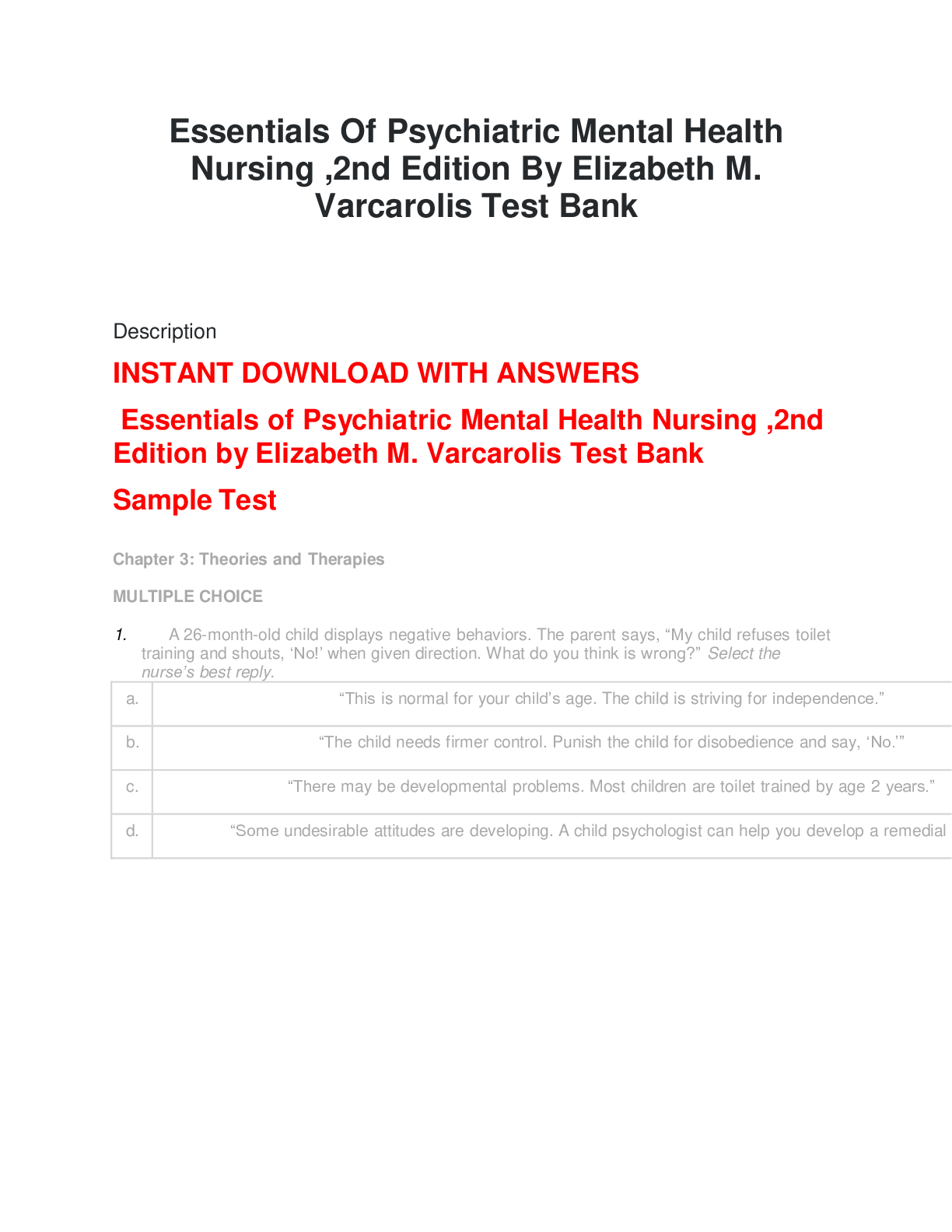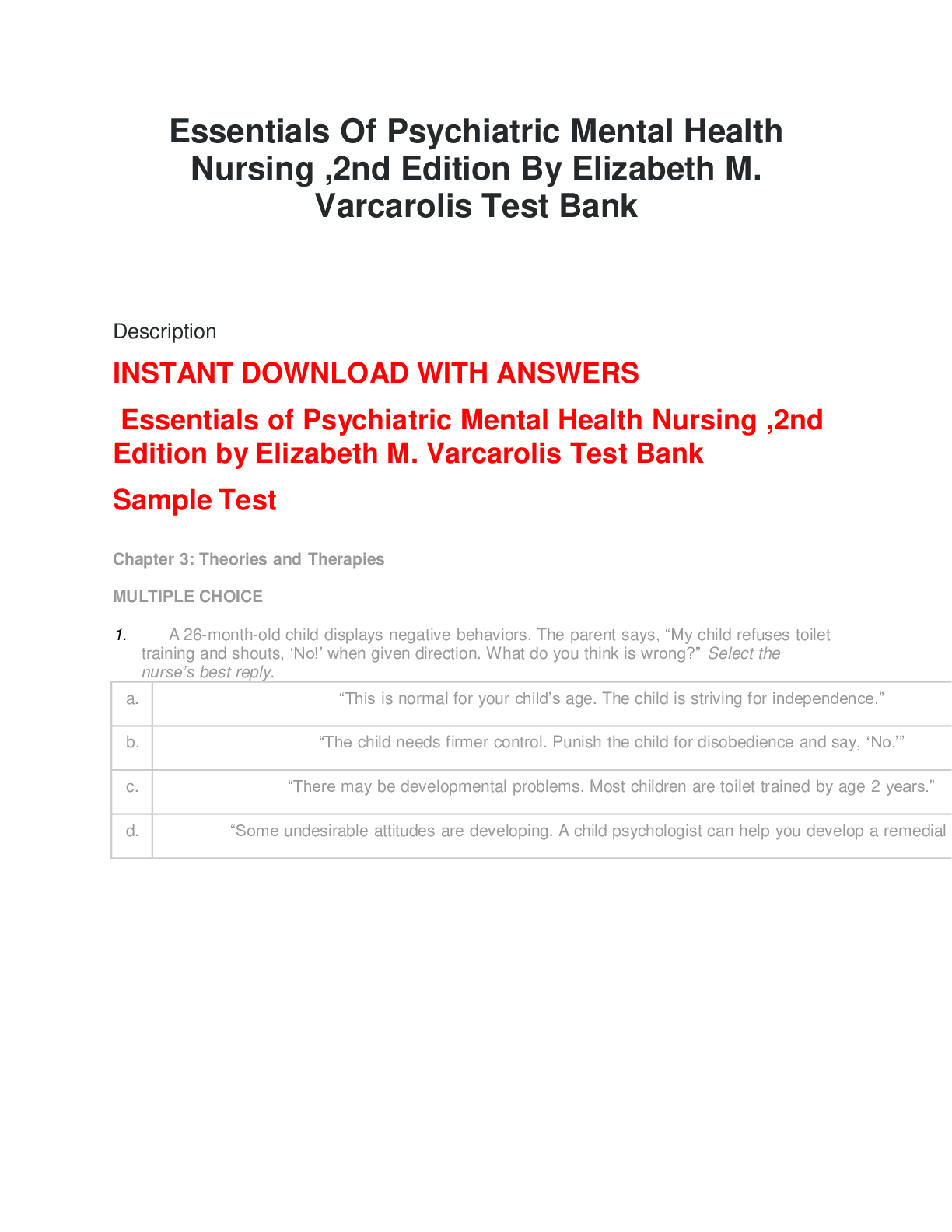Chapter 3: Theories and Therapies
MULTIPLE CHOICE
1. A 26-month-old child displays negative behaviors. The parent says, “My child refuses toilet
training and shouts, ‘No!’ when given direction. What do you think is wrong?” Select the
nurse’s best reply.
a. “This is normal for your child’s age. The child is striving for independence.”
b. “The child needs firmer control. Punish the child for disobedience and say, ‘No.’”
c. “There may be developmental problems. Most children are toilet trained by age 2 years.”
d. “Some undesirable attitudes are developing. A child psychologist can help you develop a remedial
ANS: A
These negative behaviors are typical of a child around the age of 2 years whose developmental
task is to develop autonomy. The remaining options indicate the child’s behavior is abnormal.
DIF: Cognitive Level: Application REF: Pages: 28-30
TOP: Nursing Process: Implementation MSC: NCLEX: Health Promotion and Maintenance
2. A 26-month-old child displays negative behavior, refuses toilet training, and often shouts,
“No!” when given directions. Using Freud’s stages of psychosexual development, a nurse
would assess the child’s behavior is based on which stage?
ANS: B
In Freud’s stages of psychosexual development, the anal stage occurs from age 1 to 3 years and
has, as its focus, toilet training and learning to delay immediate gratification. The oral stage occurs
between birth and 1 year, the phallic stage occurs between 3 and 5 years, and the genital stage
occurs between 13 and 20 years.
DIF: Cognitive Level: Comprehension REF: Pages: 28-30
TOP: Nursing Process: Assessment MSC: NCLEX: Health Promotion and Maintenance
3. A 26-month-old child displays negative behavior, refuses toilet training, and often shouts,
“No!” when given direction. The nurse’s counseling with the parent should be based on the
premise that the child is engaged in which of Erikson’s psychosocial crises?
ANS: D
The crisis of Autonomy versus Shame and Doubt is related to the developmental task of gaining
control of self and environment, as exemplified by toilet training. This psychosocial crisis occurs
during the period of early childhood. Trust versus Mistrust is the crisis of the infant, Initiative
versus Guilt is the crisis of the preschool and early school-aged child, and Industry versus
Inferiority is the crisis of the 6- to 12-year-old child.
a. Oral
b. Anal
c. Phallic
d. Genital
a. Trust versus Mistrust
b. Initiative versus Guilt
c. Industry versus Inferiority
d. Autonomy versus Shame and Doubt
DIF: Cognitive Level: Comprehension REF: Pages: 28-30
TOP: Nursing Process: Assessment MSC: NCLEX: Health Promotion and Maintenance
4. A 4-year-old child grabs toys from siblings, saying, “I want that toy now!” The siblings cry,
and the child’s parent becomes upset with the behavior. Using the Freudian theory, a nurse
can interpret the child’s behavior as a product of impulses originating in the:
ANS: A
The id operates on the pleasure principle, seeking immediate gratification of impulses. The ego
acts as a mediator of behavior and weighs the consequences of the action, perhaps determining
that taking the toy is not worth the parent’s wrath. The superego would oppose the impulsive
behavior as “not nice.” The preconscious is a level of awareness.
DIF: Cognitive Level: Application REF: Pages: 28-30
TOP: Nursing Process: Assessment MSC: NCLEX: Health Promotion and Maintenance
5. The parent of a 4-year-old rewards and praises the child for helping a younger sibling,
being polite, and using good manners. A nurse supports the use of praise because according
to the Freudian theory, these qualities will likely be internalized and become part of the child’s:
Read More


